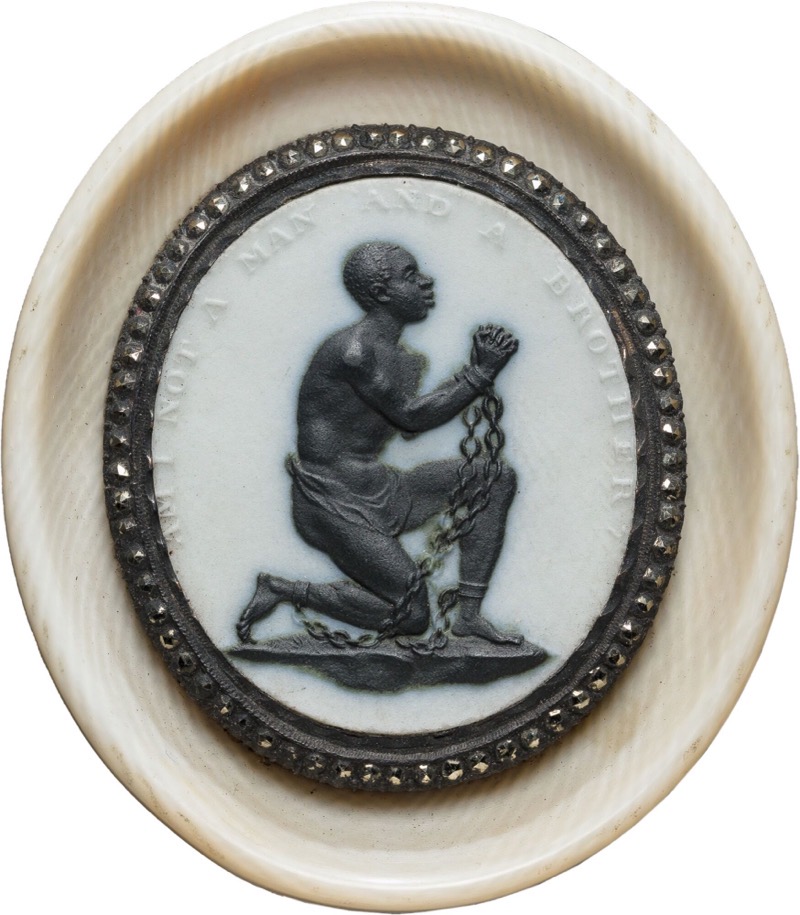
An anti-slavery medallion by Josiah Wedgwood
But:
Wedgwood seems to have thrown himself behind the cause of abolition out of genuine conviction. The medallion presented a marketing opportunity of sorts, but he manufactured it in large numbers at his own cost and ran the risk of alienating wealthy customers who opposed abolition. At the same time, as Hunt acknowledges, Wedgwood’s business was inextricable from the socioeconomic structures that sustained the slave trade. He depended on secure colonial shipping routes and sold extensively to the American colonies: Boston and Kingston were the perfect place to offload wares that had passed the peak of fashion back in Britain. Closer to home, many of his British customers derived their fortunes, one way or another, from colonial trade, including the trade in human beings. This trade helped to fuel the boom in domestic consumption that allowed Wedgwood to dream of selling high-quality artistic tableware to a growing middle-class market. Colonial commodities such as coffee, tea and sugar, with their accompanying social rituals, provided the raison d’être for many of Wedgwood’s most successful products.
a year of new avenues
A year of new avenues: a fantastic post by Robin Sloan, just fizzing with ideas. Here are the ones dancing in my head like a vision of sugarplums:
- “It’s plain that neither the big tech companies nor the startup financiers are going to produce the tools we need for the next decade. Almost by definition, any experiment that’s truly pathbreaking and provocative is too weird and tiny for them to suffer. They are trapped in their stupendous scale; lucky us.”
- “Publishing on the internet is a solved problem; finding each other on the internet, in a way that’s healthy and sustainable … that’s the piece that has never quite fallen into place.”
- “Back in the 2000s, a lot of blogs were about blogs, about blogging. If that sounds exhaustingly meta, well, yes — but it’s also SUPER generative. When the thing can describe itself, when it becomes the best tool to talk about itself, some internal flywheel gets spinning, and interesting things start to happen.”
- “This isn’t a time for ‘products’, or product launches. It’s not a time to toil in secret for a year and then reveal what you’d made with a shiny landing page. Rather, I believe it’s a time to explain as you go.”
- “I’m not saying you shouldn’t create a Mastodon account, or that you can’t have fun, percolating conversations there. I’m just saying that it doesn’t represent a sufficiently interesting experiment, because it accepts too much as settled.”
Currently listening: Van Morrison, Veedon Fleece (one of my favorite records for more than forty years now). 🎵
In Douglas Rushkoff’s new book, he acknowledges that he was wrong to say, as he was perhaps the first to do, that to the social media platforms you are not the customer but the product. Rather, he now argues, the company’s stock is the product; you are the unpaid labor that increases the value of that product.
When I read crypto-bro stories like this one I always think of Yeats: “The rhetorician would deceive his neighbor, / The sentimentalist himself.”
Currently listening: Charles Mingus, Blues and Roots ♫

Leon Shamroy, writing in American Cinematographer in 1947:
Not too far off is the "electronic camera." A compact, lightweight box no larger than a Kodak Brownie, it will contain a highly sensitive pickup tube, 100 times faster than present-day film stocks. A single lens system will adjust to any focal length by the operator merely turning a knob, and will replace the cumbersome interchangeable lenses to today. Cranes and dollies weighing tons will be replaced by lightweight perambulators. The camera will be linked to the film recorder by coaxial cable or radio. The actual recording of the scene on film will take place at a remote station, under ideal conditions. Instead of waiting for a day —or days, in the case of shooting with color — electronic monitor screens connected into the system will make it possible to view the scene as it is being recorded. Control of contrast and color will be possible before development.
It is not too difficult to predict the effect of such advancements on the production of motion pictures. Economically, it will mean savings in time and money. Since the photographic results will be known immediately, it will be unnecessary to tie up actors and stages for long periods of time. The size and sensitivity of this new camera will make photography possible under ordinary lighting conditions. Shooting pictures on distant locations will be simplified. generators, lighting units, and other heavy equipment will be eliminated, thus doing away with costly transportation.
Currently listening: Ella Fitzgerald Sings the George and Ira Gershwin Song Book ♫

Currently reading: Trickster Makes This World by Lewis Hyde 📚
This post by Victor Mair on the staggering variation in translations of the Daodejing points to something that has been worrying me. I want to go father with my investigations into Daoism — see the relevant tag at the bottom of this post — but I keep running into differences in the various translations that are this extreme or even more so. I’m starting to think that I’m either going to have to abandon my Daoist inquiries … or learn Chinese. The latter being a very daunting thought, especially at my age. (If I’m going to pursue any language with an alphabet other than my own, it probably should be Greek — which I know a bit of — or Hebrew — which I don’t really know at all.)
and then?

Illustration by my buddy Austin Kleon
As I mentioned in earlier posts, Noah Smith wants to outsource much of the process of writing, and Derek Thompson wants to outsource his research. In other news, Marina Koren is bothered by the slowness of 2001: A Space Odyssey, and her partner wants to watch the movie at 2X speed. Perhaps he also participates in the TikTok practice of listening to songs at double-speed.
My question about all this is: And then? You rush through the writing, the researching, the watching, the listening, you’re done with it, you get it behind you — and what is in front of you? Well, death, for one thing. For the main thing.
But in the more immediate future: you’re zipping through all these experiences in order to do what, exactly? Listen to another song at double-speed? Produce a bullet-point outline of another post that AI can finish for you?
The whole attitude seems to be: Let me get through this thing I don’t especially enjoy so I can do another thing just like it, which I won’t enjoy either. This is precisely what Paul Virilio means when he talks about living at a “frenetic standstill” and what Hartmut Rosa means when he talks about “social acceleration.”
I say: If you’re trying to get through your work as quickly as you can, then maybe you should see if you can find a different line of work. And if you’re trying to get through your leisure-time reading and watching and listening as quickly as you can, then you definitely do not understand the meaning of leisure and should do a thorough rethink. And in both cases maybe it would be useful to read Mark Helprin on “The Acceleration of Tranquility.”
Megan McArdle, arguing that trying to use social media’s moderators to crack down on misinformation isn’t a good idea:
For one thing, moderators aren’t good at determining what constitutes actual misinformation. A lot of the dangerous nonsense about covid that circulated on social media came from the same public health experts social media companies were using as arbiters.
It was public health experts who initially told us masks don’t work, an assertion they knew to be false. It was public health experts who insisted, without good evidence, that covid wasn’t airborne. And many public health experts helped support prolonged school closures that have been proven to undermine learning.
That is not to say that public health experts are the moral or intellectual equivalent of quacks peddling balderdash about vaccine side effects. The public health community eventually recognized its most egregious errors, while the quacks doubled down. But free and open debate on social media assisted that process of course correction, and cracking down on what the experts then deemed false information would actually have slowed the pace of adjustment.
A game of unforced and amateurish errors by 🇺🇸 ⚽️ — oh well.
Where’s Brian McBride when you need him? 🇺🇸 ⚽️
A wonderful idea from Zeynep Tufekci: donate to Partners In Health in memory of the great Paul Farmer. I’ve just done it.
Much talk in the past 24 hours about Luis Suarez’s deliberate handball against Ghana in the 2010 World Cup. At Brian Phillips’ much-missed Run of Play, I wrote about it when it happened. ⚽️
Foggy morning in the canyon.



